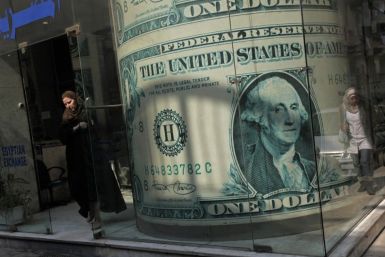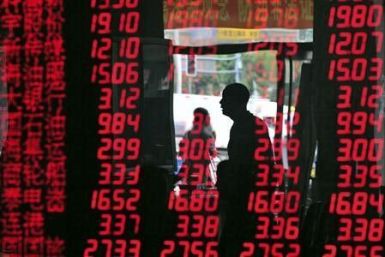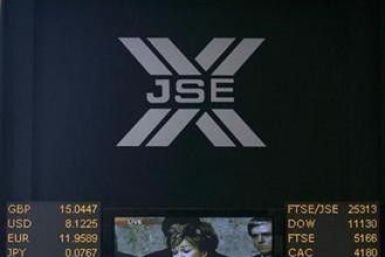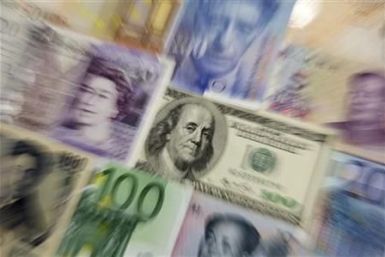South Africa's economy grew at its slowest pace in almost two years in the second quarter as the manufacturing and mining sectors slumped after strikes, boosting the case for interest rate cuts while denting the government's job-creation hopes.
Confidence among consumers plunged in August to its lowest in more than two years following the country's loss of its top credit rating and heart-wrenching drops in major stock indexes.
Stock index futures pointed to a weaker open for equities on Wall Street Tuesday after steep gains in the previous session, with futures for the S&P 500, for the Dow Jones and for the Nasdaq 100 down 0.2 to 0.3 percent.
The struggling U.S. economy expanded even more slowly than previously thought in the second quarter of 2011, but a breakdown of the growth suggested a new recession could be avoided.
The economy grew much slower than previously thought in the second quarter as business inventories and exports were less robust, a government report showed on Friday, although consumer spending was revised up.
It's true that mounting facts support the argument that we're experiencing Tech Bubble 2.0, primarily because of what seems to be overzealous enthusiasm for Internet company stock IPOs on Wall Street in recent months.
Canadian retail sales rose a seemingly healthy 0.7 percent in June from May, but the figure prompted little enthusiasm from analysts who noted a one-off jump in auto sales had fueled most of the gain.
Adrian Tan owns two Mercedes sedans and is looking to buy a third car. The 36-year-old financial trader was shopping with his wife on a Singapore street lined with luxury car dealerships and said he may stick with Mercedes or go for an Audi or a BMW.
Gold prices eased for a third session on Monday as stock markets and cyclical assets such as industrial commodities continued to recover from a rout they suffered early last week, diverting investment away from the precious metal.
Asian equities bounced on Monday and safe-haven assets like gold and the Swiss franc fell as market players cautiously returned to pick up bargains after last's week wild ride, though concerns over the weak global economic outlook may keep gains in check.
Gold prices eased for a third session on Monday as stock markets and cyclical assets such as industrial commodities continued to recover from a rout they suffered early last week, diverting investment away from the precious metal.
Asian equities bounced on Monday and safe-haven assets like gold and the Swiss franc fell as market players cautiously returned to pick up bargains after last's week wild ride, though concerns over the weak global economic outlook may keep gains in check.
Gold dropped 1.5 percent on Friday, falling further from the previous session's record highs, as a rise in appetite for riskier assets prompted profit-taking from bullion's sharp safe-haven rally this week.
South Africa's rand steadied against the dollar on Friday but faced further losses after a turbulent week in which it hit its weakest levels in more than a year as investors spooked by debt woes in the U.S. and Europe fled to safer havens like the yen.
U.S. consumer confidence plunged in August, according to the latest reading. The level is the lowest since 1980.
Gold and silver mining company stocks fell Friday as the broader equity markets posted gains, extending for a second day their rebound from this month's horrendous downdraft.
Gold prices fell on Friday, extending the previous session's retreat from record highs as fresh strength in equity markets and gains in the euro versus the safe-haven Swiss franc pointed to sharper appetite for risk.
U.S. July retail sales moved higher, according to the Commerce Department, and stock markets advanced on the report Friday.
Gold prices eased in Europe on Friday, extending the previous session's retreat from record highs, as fresh strength in equity markets and gains in the euro versus the safe-haven Swiss franc pointed to sharper appetite for risk.
Gold recoiled after tapping a new record on Thursday, tumbling more than 2 percent as an equities rebound and higher trading margins fanned profit-taking from the biggest rally since 2008.
The Swiss franc hovered near record highs against the dollar and euro in Asia on Tuesday, having surged on the back of a global stock market rout as a crisis of confidence gripped investors.
The largest Internet retailer benefited from growth in e-commerce, though margins continued to be pressured by heavy spending on distribution, technology and digital content.





























